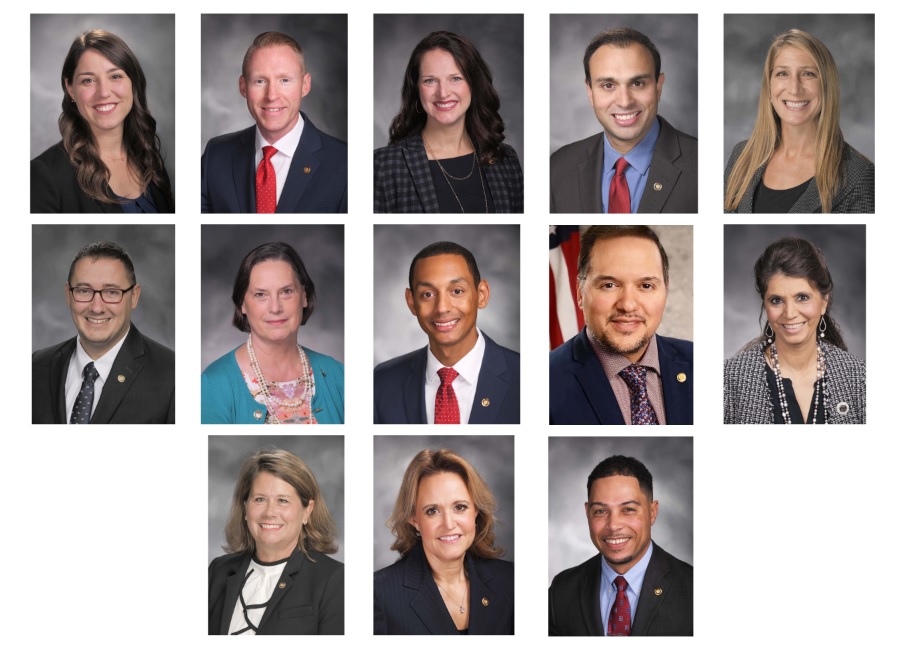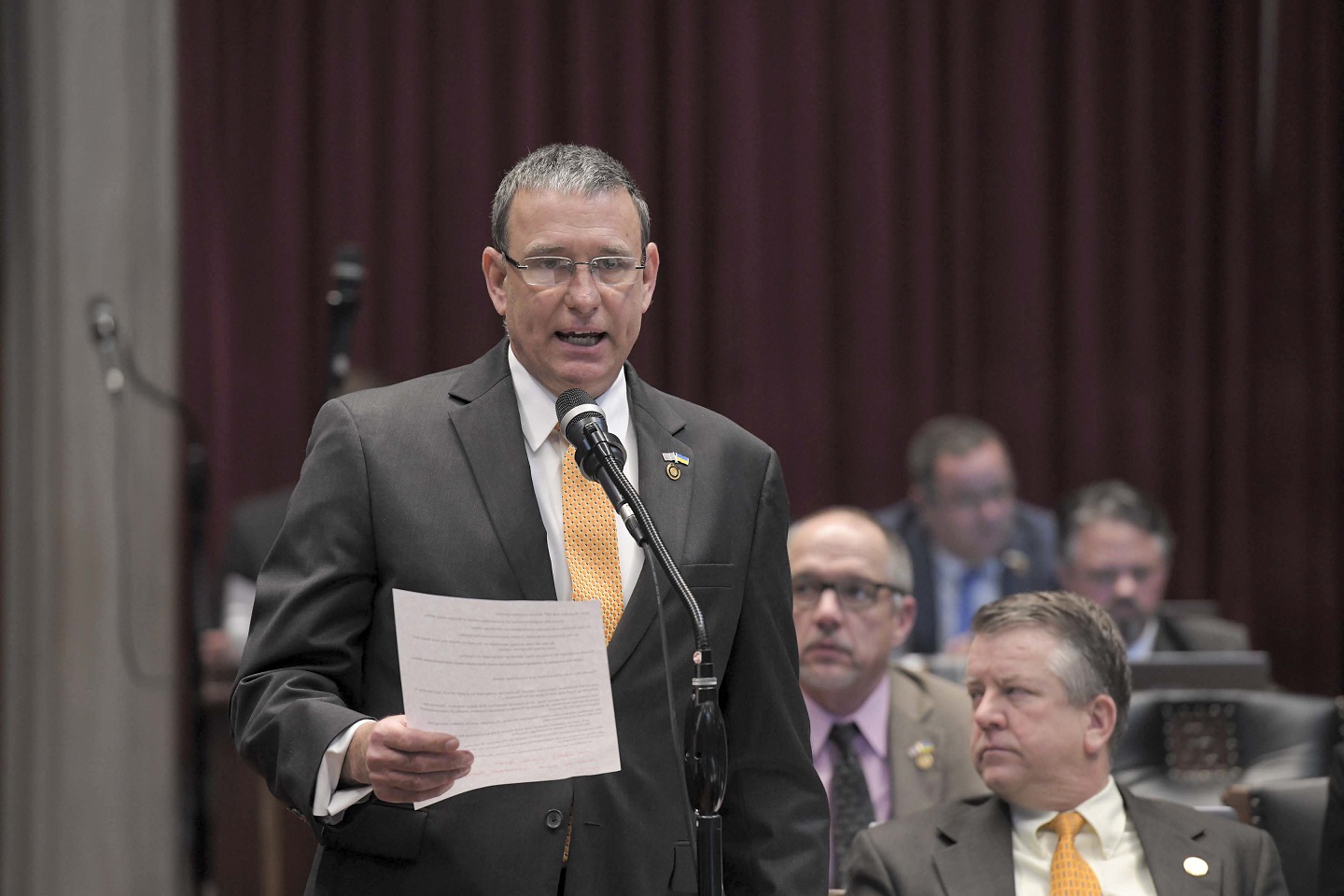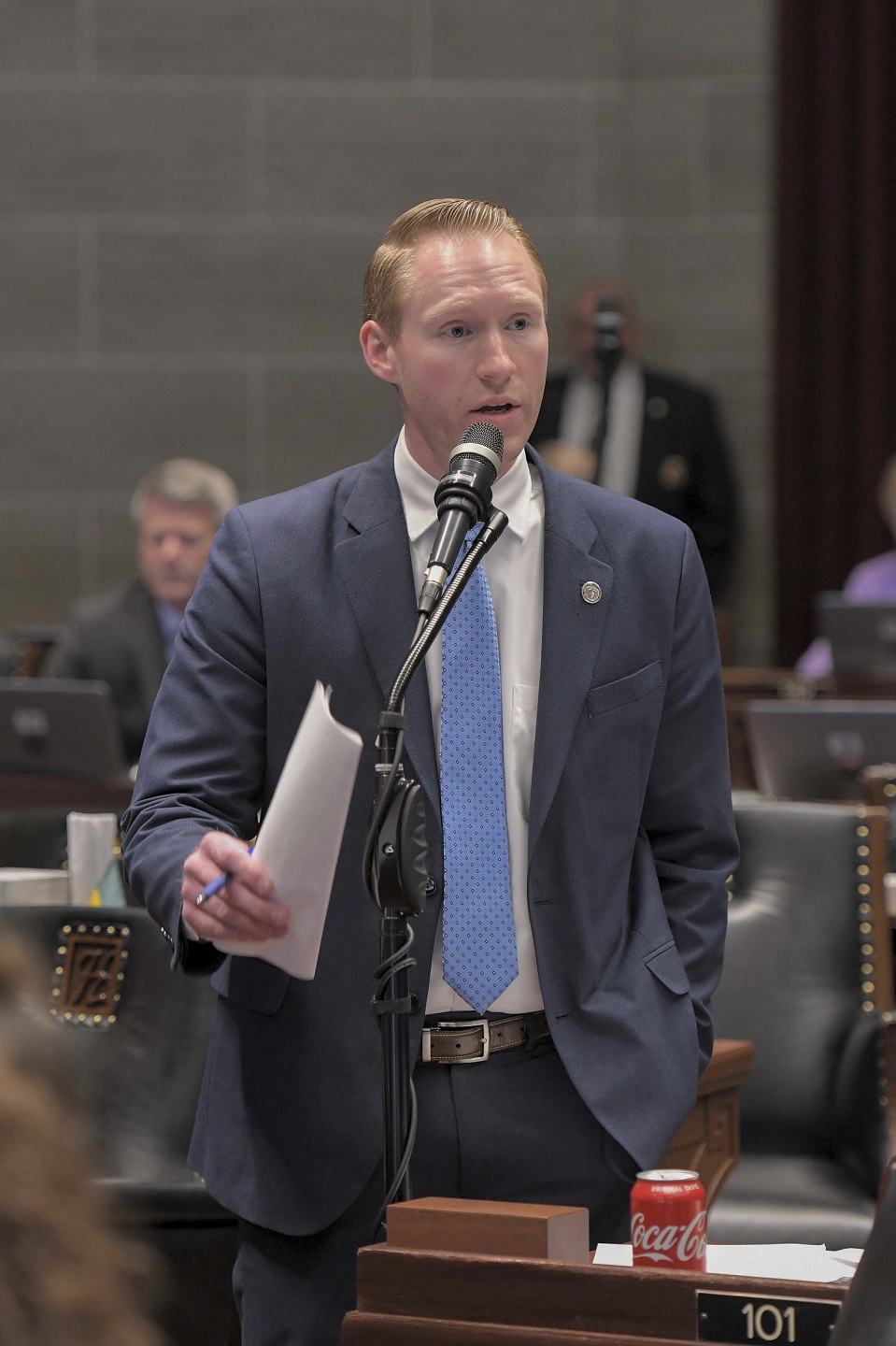Representative Adam Schnelting (R-St. Charles) was joined by his children in saying goodbye to the House on the final day of the 2024 session:
Tag: Adam Schnelting
Bipartisan Array of Bills from 13 House Members would Cut Taxes on Food, Diapers, or Feminine Hygiene Products
Many House lawmakers think Missourians need a break in the taxes they pay to the state. Thirteen House members, nearly evenly split across party lines, have proposed doing so by cutting taxes on necessary products, particularly diapers, feminine hygiene products, and food.
As the legislature enters the final few weeks of its session those bill sponsors are hoping their proposals will get some traction, perhaps as amendments to other proposals, or at least legislative hearings that could spur movement in future years.

None of these proposals have been referred to committees.
Missouri is one of only 13 states in the nation that taxes food. Three neighboring states do not tax food, and Kansas will join that number next year. St. Charles Republican Adam Schnelting is one of the legislators proposing that Missouri do the same.
Schnelting said as inflation has skyrocketed in recent years, he has hoped that his idea would catch on amount his House colleagues.
“My own family, my daughter is 6 years old, my son is 18 months old, we have a growing family and we feel it in our own pocketbook. I know I’ve got a lot of constituents and a lot of people back home that feel it in their pocketbook. If people in my district have to live within their means then so does the government,” Schnelting said. “My wife and I were spending almost $1,000 a month on food … every little bit helps and adds up. If you’re talking several hundred dollars that can go toward over things, like diapers.”
Lone Jack Republican Chris Sander said in districts such as his, which is near the border with Kansas, Missourians are taking advantage of the lower rates some neighboring states offer.
Robert Sauls (D-Independence) proposes exempting food not only from the state sales tax of 1.225 percent, but also from local sales and use taxes, which in some parts of the state drive the rate up to more than eight percent.
Representative Chris Dinkins (R-Lesterville) said she and other legislators are seeing more and more of their constituents struggling, and they want to help.
“I think we’re always looking at ways to help the citizens of Missouri,” Dinkins said. “When you look at people’s income status, you find that your lowest income people spend the largest percentage of their income on food, so they are the ones that’s most impacted by the sales tax. They spend around 30 percent or more of their income on food, whereas your middle income people only spend a little over 10 percent, so we’re impacting the people that need it the most, and we’re trying to help those that need it the most.”
Missouri taxes diapers and feminine hygiene products at 4.225 percent. Several neighboring states tax those products at a greater rate, but three don’t tax feminine hygiene products at all and one does not tax diapers.
The 4.225 percent rate is often called a “luxury” tax, as it is applied to items that are deemed non-essential. That doesn’t sit well with many lawmakers, including Representative Mark Sharp (D-Kansas City, who proposes taxing such items at the lesser 1.225 percent.
“They should not be taxed at a luxury rate … so reducing them down to a food sales tax, I believe, is the very least that we can do,” said Sharp. “Many states have gone as far as just removing the tax altogether, so we have to something to at least move the needle.”
Others, like Republican Wendy Hausman (St. Peters) want to take the extra step of eliminating the state sales tax on those items, altogether.
Hausman, who is in her second year as a freshman legislator, said the idea was brought to her by fellow members of a businesswomen’s group, Little Black Book.
“We want to make sure that we’re supporting Missouri families by making it easier for them, especially in a day and age where they try to tax you and gouge you everywhere. We need to figure out ways to try to give people and families relief,” said Lake St. Louis Republican Representative Justin Hicks. “We all know that females need feminine hygiene products, that’s a given, and with people having kids out there we all know that diapers are usually a major expense to a family.”
Many legislators and advocates point out that difficulty affording or providing necessary products has a ripple effect, contributing to issues with both mental and physical health.
“From a parent’s perspective, not being able to provide an essential item for their baby [such as diapers] has a mental toll, so it impacts their mental aspect. Also [as] a workforce issue, on average, parents in diaper need miss 5.1 days of work a month because they can’t afford diapers to send to child care with their child, so this is a workforce issue,” said Representative Patty Lewis (D-Kansas City). “Then not to forget the physical health aspect that it has on a baby, sitting in saturated diapers hours after hours. From UTIs to diaper rash, sometimes if they’re not cured with over-the-counter medicine they have to go to the physician or the pediatrician, so additional time off work for the parents and additional cost for the parents as well, and then there can be long-term effects, from renal failure or renal insufficiency, for these babies.”
St. Louis Democrat Barbara Phifer points out, “Period products, especially, are very intimate and personal. If you think about young girls who are going through puberty, and if they don’t have access to those products, their school participation drops dramatically.”
Opposition to these ideas in past years has come from local governments, who say cutting taxes on these products jeopardizes services they provide, such as emergency responders.
“I think that kind of deterred it,” said St. Louis Democrat Jo Doll. “Hopefully this year we can finally get [the tax cut on diapers and feminine hygiene products] across the finish line. I think the biggest problem is that it always gets attached to something and whatever it’s attached to falls apart.”
House Democrat leader Crystal Quade’s (Springfield) plan to cut taxes on food would let Missourians vote on a number of tax changes, including a tax on private planes and yachts, and create a fund in the state’s coffers to help local governments transition.
“Missourians are suffering right now when it comes to making ends meet, and it’s our job to come up with solutions that help everyone,” Quade said. “It’s up to us to figure out ways to make up those losses and that shouldn’t be a burden on the regular taxpayer.”
Representative Maggie Nurrenbern (D-Kansas City), who is in her fourth year on the House Budget Committee, said the state can afford to reduce these taxes.
“We’re looking at record budgets and we have a record surplus still in the state treasury. What can we actually do to pass on cost savings to working families?” said Nurrenbern. “I hate to see a mom standing in the line making that decision, ‘Do I buy this pack of diapers or that gallon of milk,’ and those are the decisions our families are faced with every single day, and it’s time now, to pass that savings on to families and cut the state portion of sales tax on essential items.”
Chesterfield Republican Ben Keathley said the growth in support for these proposed sales tax cuts is a direct response to inflation hikes over the past several years.
While 13 legislators contributed to this article, Keathley said more will get on board the longer such ideas are not passed.
Missouri House condemns attack on Ukraine in unanimous vote
The Missouri House voted unanimously today to condemn the Russian attack on Ukraine and to urge the federal government to respond prudently.

It approved House Resolution 3658 which says the members of the House, “Stand alongside Ukraine, its people, and its leaders during this horrific and unnecessary war and vow to support Ukraine and hold Russia fully accountable for its catastrophic decision to invade.”
It was carried by Representative Mike Haffner (R-Pleasant Hill), a decorated combat veteran who retired from the U.S. Navy as a Commander.
“This invasion is not about land. It’s not about oil. It’s not about natural resources. It’s about freedom. Ukraine has embraced the definition of American freedom as it is defined very clearly in the Declaration of Independence because that freedom results in unprecedented opportunity for all people,” Haffner said.
Representative Michael O’Donnell (R-St. Louis) is a Lieutenant Commander in the U.S. Navy Reserve. He said he’s been watching the coverage of Russian forces entering Ukraine equipped not to destroy military targets or equipment, but to kill people. He’s marveled at the response of the Ukrainian people.
Lee’s Summit representative Keri Ingle (D) said the people of Ukraine are much like the people of Missouri in what they want for themselves and their loved ones.
“We must support democracy across the world or it will be lost here as well,” said Ingle.

Some representatives said the House’s action today isn’t just about what’s happened in the last week, but what will come if Russia doesn’t stop or isn’t stopped. Representative David Tyson Smith (D-Columbia) said, “We need to take a stand against oppression and tyranny and we all know that if Russia takes Ukraine it’s not going to stop with Ukraine.”
St. Charles Republican and member of the National Guard Adam Schnelting added, “It’s very important that we stand in solidarity with the people of Ukraine not just for Ukraine but also so that Europe does not digress into centuries of darkness.”
The House voted 143-0 to support the resolution which states, as Rep. Haffner read, “we proudly stand alongside Ukraine, its people, and its leaders during this horrific and unnecessary war and vow to support Ukraine and hold Russia fully accountable for its catastrophic decision to invade this sovereign nation.
Anti-doxing bill would protect Missouri first responders
Missouri House members are being asked to protect law enforcement officers and other first responders and their families by protecting the personal information of those individuals.
House Bill 59 has been called the “First Responders Protection Act.” It would bar counties from disclosing the address or personal information of law enforcement officers and first responders, upon their request. This would be directed at county clerks, collectors, treasurers, auditors, and recorders of deeds.

It would also make illegal the “doxing” of those individuals; that is, the posting of such information on the internet with the intent of causing harm to them.
The bill’s sponsor, St. Charles Republican Adam Schnelting, said such information has been used to target law enforcement officers and their loved ones.
Dale Roberts with the Columbia Police Officers Association said Columbia officers have been targeted by those they’ve arrested.
“They track our officers down. They called our officers after being arrested and said, ‘I know your daughter, Amanda, goes to Grand Elementary School. I know you live at 309 Pine Street,’ and threaten the officers and their families,” Roberts told the House Committee on Public Safety.
“We go to work every day and we understand the responsibilities, the duties, and the dangers of our job,” said Missouri Lodge of the Fraternal Order of Police president Rick Inglima. “A bill like this would be paramount in helping our officers protect themselves, to keep their information undisclosed – either online or by going through the county records, to keep our officers and their families safe.”
Backers said the legislation could save local law enforcement agencies money that is expended to protect officers who have been targeted due to access to their personal information.
The Recorders Association of Missouri testified against the bill. Speaking for the Association, Jessica Petrie stressed that it supports the intent of the legislation but implementing it wouldn’t be practical.
She said the bill’s prohibition on the release of any data related to an officer’s address could interfere with the sale of property.
Petrie said with the range of capabilities and technologies across Missouri’s 114 counties and the city of St. Louis it is hard to predict what it would take – especially in terms of cost – for all of them to get software or other items necessary to comply with the requirements of HB 59.
The Missouri NAACP also opposes the legislation, saying it would create crimes and penalties redundant to current Missouri law. Sharon Jones with the Association joined the Recorders Association in suggesting that many of the bill’s goals could be met by extending to law enforcement officers the Safe At Home Program, which allows survivors of domestic violence and other crimes hide their address.
The bill’s supporters note that Safe At Home’s protections are not retroactive, so records already available through county offices would stay that way.
The committee has not voted on HB 59.